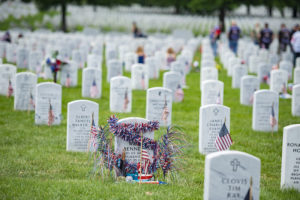
Flags, flowers and other mementos adorn headstones in Section 60 of Arlington National Cemetery, Arlington, Virginia, May 27, 2018. Every year over Memorial Day weekend, over 135,000 visitors come to Arlington National Cemetery to honor those who have died while in the armed forces. (U.S. Army photo by Elizabeth Fraser / Arlington National Cemetery / released)
Four years ago, a guy who looks like he went from online gaming to Christian rock made a bad argument on the internet. It’s probably not even right to call it an argument–it was a series of related assertions made in sequence. The headline foreshadowed a few of them: “You don’t protect my freedom: Our childish insistence on calling soldiers heroes deadens real democracy.” The same publication had tried to get traction with an article a few months earlier entitled “Stop calling soldiers “heroes”: It stops us from seeing them as human — and dismisses their experience.” The search-engine optimization of the one that came later caused the viral ruckus–and the clicks–the editors were probably looking for with the first piece.
The article bothered me, because I found it a careless version of some of my own thinking. The dopey article and the backlash prevented me from developing the thoughts any further at the time, but every Memorial Day, versions of those thoughts resurface. With those articles behind us, and with Memorial Day fresh in our memories, I thought it might be a good turn to take a whack at the subject.
We have lots of tropes about our soldiers and our wars, to include “they fight for our freedom.” I was reminded of this argument when a conservative lobbyist who moonlights as a DC food blogger took to Twitter this Memorial Day to say “Thank you to all those who made the ultimate sacrifice for us to live in a free country where we can eat this.” (see the tweet below).
Granted, this is a particularly absurd version of the argument, but to be clear: there are halal sausages and Korean sausages. Germany fights fewer wars than we do but has excellent sausages and…one could go on. No matter how badly any conceivable modern war went, nobody is going to take away America’s silly hot-dog-with-an-onion-ring-on-top, pork or not.
But rejecting the idea that our wars prevent burqas from being draped over our daughters or save our tasty lunches leaves us with another question: What did we fight them for, then? Or more to the point, for what did our friends and sons and fathers die?
It’s a normal human instinct to search for meaning in tragedy. Most people have a hard time with the idea that one’s friends and family died in vain, but one approach is to reach for abstractions. In the Gulf War, for example, 149 Americans died in pursuit of defending the sanctity of borders and establishing the principle that the United States would oppose cross-border aggression where it could. Was that worth 149 American lives? Open to debate, but it’s a principle.
But in the case of Vietnam, or Iraq, or Afghanistan, or even as far back as Korea, the question gets murkier. 58,000 killed in Vietnam only for Saigon to fall, Vietnam to go Communist (to no material benefit of the Soviet Union), then to normalize relations less than three decades later? The argument gets a lot harder.
But the idea of troops being heroes is one that also merits attention. In any organization with millions of members, it is obviously true that not all of them has engaged in heroism. Some have engaged in cowardice, some in muddling through, and some in heroism. But whatever the cause of the war, if we agree that the possession of a military is a legitimate function of the government, and take the idea of civilian control of the military seriously, we truly owe recognition and appreciation for acts of heroism that occur during the nation’s wars. Put differently, we should appreciate their bravery and selflessness with the same intensity that we feel revulsion at an Abu Ghraib or My Lai.
Joining the two questions together is where things become interesting, though. An analogy with domestic service helps here, I think. Say a fire department is regularly having to respond to fires across town. The firefighters act with bravery and professionalism, on occasion saving the townspeople and each other from harm, sometimes giving their own lives in the process. We should appreciate their service. But if we found out that the fire chief was the one setting many of the fires himself, it would be malpractice to leave that finding out of our analysis of fires in the city. In fact, one could argue that that is the single most relevant fact to appreciate in service of the firefighters themselves. Revering their service while failing to observe the fire chief’s activities neglects a duty we, as their employers, owe them.
There ought to be no problem believing that our wars, and the troops who died in them, had very little to do with “our freedom,” but that many of those fighting did so with professionalism and bravery, and in service to the imperfect system we have for defending the country. On Memorial Day, and every day we’re at war, it’s good not just to appreciate the troops, but also to spend a moment trying to figure out why our wars keep happening, what benefits they produce, and what we could do to try to help prevent the terrible sacrifice so many of our countrymen have borne.
Thank you to all those who made the ultimate sacrifice for us to live in a free country where we can eat this. Custom creation from @DogHausDogs #MDW pic.twitter.com/yF53DKzoXL
— HungryLobbyist.com (@HungryLobbyist) May 27, 2018




